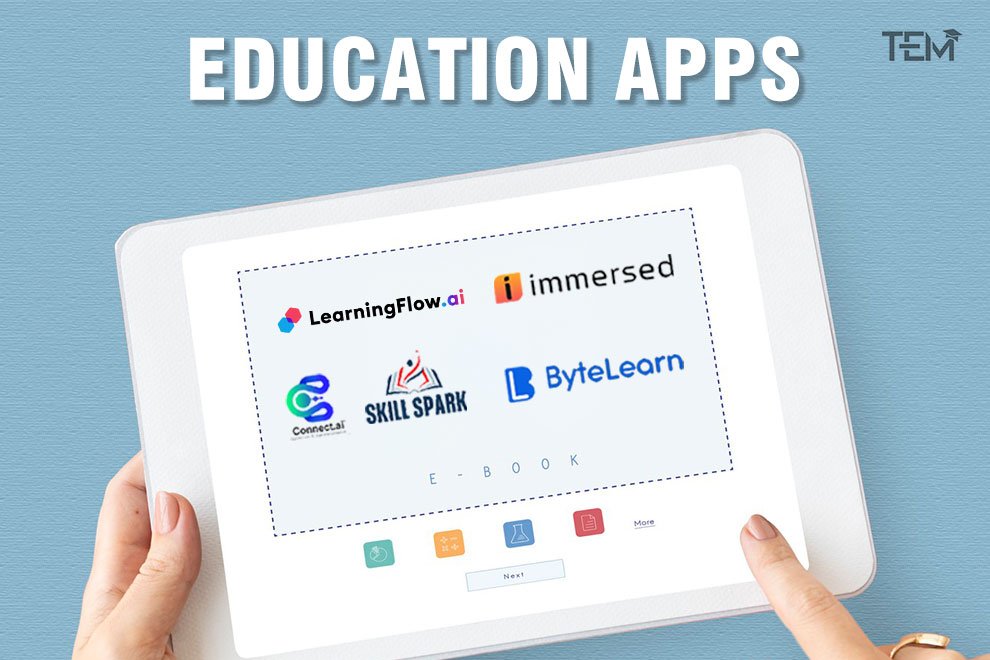So, the future of how we learn? It’s not some far-off idea anymore, is it? By 2025, education apps will have transformed from what they are now, becoming, totally essential tools for grabbing knowledge, getting new skills, and getting into learning.
Forget those old-school textbooks and that whole “one size fits all” thing. The education apps of 2025? They’re going to be super smart, always adapting, and, like, totally personalized, you know? They’ll get what you need, no matter what.
1. Learn flow AI: Your Brainy Buddy for Learning Anything
AI in EdTech? It’s becoming the main deal, not just a cool extra, right? Forget those kinds of clunky AI chatbots we see now. By 2025, super smart AI will be like your own personal learning brain in Learn Flow AI—always figuring things out, really understanding you, and always trying to make your learning faster, smarter, and way more effective. Experts are saying this is going to be a huge shift, you know?
Imagine a learning app that doesn’t just check if you got the answer right or wrong, but gets how you’re thinking. Learn flow AI? It’ll look at how you learn, really nail down where you’re awesome and where you’re maybe tripping up (sometimes even before you realize it yourself!), and like, subtly change the lessons in real time to fit your brain perfectly. Think of math problems that get easier or harder depending on how you’re trying to solve them, not just if you got the final answer right.
Or history stuff that changes based on what you’re asking and what you’re into, really pulling you into the topics you’re curious about. The big EdTech companies? They’re building AI that’s not just smart in a computer way; it’s like, genuinely learning-smart, making education super personal, really effective, and fun. They designed the entire system from the ground up to suit your unique learning style, finally making learning click for everyone. That’s what the tech guys are saying is coming.
Expert Insights: Getting Down to the Details with LearnFlow AI
- Beyond Just “Changing the Difficulty”: We’re talking about AI that gets how your brain works, not just surface stuff.
- Think “Brain Detective” AI: systems that try to figure out how your brain is processing information, not just if you’re getting good grades.
- They’re Playing with AI That Can Tell How You’re Feeling: Companies are trying out AI that can see if you’re losing focus, getting into it, or even getting frustrated—using things like your face and tiny movements to make learning better in ways we couldn’t even imagine a few years ago.
2. ImmerseEd: Step Inside What You’re Learning with VR and AR
By 2025, you know those virtual reality (VR) and augmented reality (AR) things? They won’t just be some cool extra in education apps; they’ll be normal, especially for those subjects that are kind of hard to picture in your head. Imagine learning about the human heart, not just from a picture, but by actually stepping inside a beating heart in VR, checking out all the parts, and seeing how it works for real. Experts are saying we’re gonna see a lot more of this VR/AR stuff in schools and for learning soon.
ImmerseEd? It’s gonna use VR to create these super real versions of historical events, so you can like, walk around ancient Rome or see the Declaration of Independence being signed, right there. In science class, you could do virtual experiments in VR, messing with stuff and seeing what happens without blowing anything up in the real world.
AR? That’ll be like having extra information pop up on top of the real world when you point your tablet at something, like pointing it at a tree and instantly seeing what kind of tree it is and how it grows. This mix of fake and real learning will be awesome for different kinds of learners, making those tricky ideas easier to get and way more interesting, helping you remember stuff better too. Actually “experiencing” something instead of just reading about it? That’s going to be a total game-changer for learning.
Expert Insights: What Makes ImmerseEd So Next-Level?
- VR/AR That Changes Just for You: The VR/AR stuff in ImmerseEd will probably change depending on how well you’re doing, maybe showing you more details or letting you play around with things more if you’re getting it.
- Learning Together in VR, Even if You’re Miles Apart: VR will let you hang out in the same virtual space with your classmates and teachers, even if you’re not in the same room, which could be cool for working together.
- VR/AR That Feels Like a Game: ImmerseEd will probably have game-like challenges in the VR/AR worlds to make learning more fun and give you something to aim for.
3. SkillSpark: Level Up Your Abilities Through Fun Challenges
By 2025, the way we learn new skills is gonna be way more engaging, and SkillSpark is looking like it’ll be leading the charge. Forget just grinding through boring exercises. Let’s imagine a coding app designed as an epic adventure where you solve puzzles and overcome challenges using programming.
Or maybe you want to get better at playing the guitar? SkillSpark could have you completing musical challenges and earning rewards that unlock new songs and techniques. It’s all about taking those skills you want to learn and making the whole process feel like a game you want to play. According to recent reports on EdTech trends, gamification that hooks you in is going to be huge [Source: HolonIQ. (2024). Global Learning Landscape Report 2024].
SkillSpark will probably use smart tech to figure out what motivates you—maybe it’s earning virtual trophies, competing with friends (in a friendly way, of course!), or just seeing your progress visually. The challenges will probably get harder as you get better, so you’re always learning and never bored.
And it won’t just be about getting points; the rewards will be things that help you learn more and show off your skills. Think unlocking new levels of courses, getting access to cool bonus content, or even earning recognition within the SkillSpark community. It’s all about making learning feel less like work and more like something you look forward to doing.
Expert Insights: What Makes SkillSpark So Addictively Educational?
- Stories and Adventures That Keep You Hooked: SkillSpark will likely weave learning into interesting stories and adventures, so you’re not just memorizing facts, you’re part of a narrative.
- Skill-Based Challenges: The app adjusts challenge difficulty based on your performance, maintaining optimal engagement.
- Rewards That Help You Grow: The rewards you earn in SkillSpark will likely unlock new learning opportunities and help you deepen your understanding.
4. Connect & Learn Pro: Your Go-To Spot for Learning Together
By 2025, education apps will focus on learning together, because, you know, it’s easier to learn when you can bounce ideas off other people. These apps won’t just be for studying by yourself; they’ll be like online hangouts where you can connect with others, work on stuff together, and learn from each other. Experts are saying that learning with others is gonna be a big focus [Source: OECD (2023). PISA 2022 Results (Volume V): Creative Minds, Creative Schools. OECD Publishing.]
Think about an app for a group project where your team can seamlessly share documents, co-edit presentations in real-time, participate in video conferences with integrated white boarding tools, and receive feedback from both peers and instructors. The app will likely feature intelligent group formation tools that help connect learners with complementary skills and interests.
It might also host virtual Q&A sessions with industry experts, allowing learners to gain insights from professionals in their field of study. Connect & Learn Pro will prioritize fostering a sense of community and shared learning, recognizing that knowledge acquisition is often enhanced through interaction and diverse perspectives.
Expert Insights: What Makes Connect & Learn Pro Great for Collaboration?
- AI That Helps Your Group Work Better: The app might have AI that helps you organize your group discussions, sum up the main points, and even suggest helpful resources.
- All the Tools You Need for Projects in One Place: Connect & Learn Pro will probably have tools to help you manage your group projects, like assigning tasks and keeping track of deadlines.
- Safe and Friendly Online Learning Spaces: The app will make sure everyone feels comfortable and respected in the online learning groups.
5. ByteLearn: Learn Anything in Small, Easy Pieces
That whole idea of learning in little chunks? Education apps in 2025 will nail that, especially for people who are always on the go and don’t have a ton of time. Education apps in 2025 will break learning down into small, focused bits, easily fitting learning into busy lives. Studies show that learning in small pieces can help you remember things better [Source: Cedefop. (2024). Microlearning: A modern solution for workplace learning [Publications Office of the European Union].
Imagine learning a new computer skill by watching a bunch of short video clips, each one showing you how to do one specific thing. Or getting ready for a test by looking at quick flashcards and doing short quizzes on an app. ByteLearn will probably feature a vast and constantly updated library of micro-lessons, ranging from short video explanations and interactive simulations to concise text summaries and engaging infographics.
ByteLearn will leverage AI to personalize learning pathways, suggesting relevant modules based on your learning goals and previous activity. We will focus on delivering high-quality, focused content consumable in minutes, making learning accessible anytime, anywhere.
Expert Insights: Why ByteLearn’s Small Bites Are So Effective
- Learning That Changes Based on How You’re Doing: ByteLearn will probably have short quizzes after each little lesson to see if you got it, and then it’ll change what you learn next based on how you did.
- Learn Even When You’re Offline: You’ll probably be able to download these little lessons and watch them even if you don’t have internet, and then your progress will save when you get back online.
- Works Well with Other Ways You’re Learning: ByteLearn might even connect with other learning apps you use, giving you little extra bits of info to help you understand things better.
Conclusion: Get Ready for App-Powered Learning!
These five education apps illustrate the future of learning, as envisioned for 2025. Even if the names and specific features change a bit, the main ideas of making learning personal, using cool techs like VR and AR, making it fun like a game, helping you learn with others, and breaking it down into small pieces are going to be big.
Using these new education apps will allow for more interesting, effective, and integrated learning. So, get ready—the future of learning is definitely in the palm of your hand!










